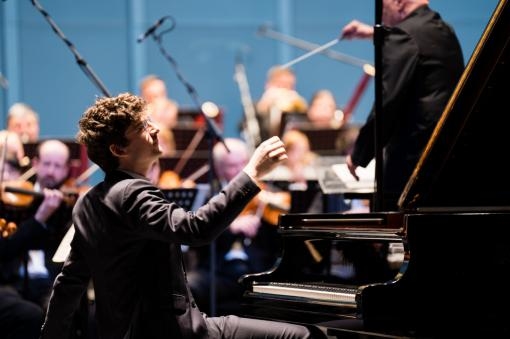The original programme of the Brno Philharmonic Orchestra’s third subscription concert, as part of the Philharmonic Orchestra series in Theatre II, promised to continue the originally scheduled Dvořák-Brahms dramaturgy line as interpreted by Elisabeth Leonská. However, of the intended programme for the evening of Dvořák & Brahms II, only Dvořák’s Symphony No. 4 remained. Because Elisabeth Leonská fell ill for the concerts on the 25th and 26th of February at The National Theatre Brno - Janáček Theatre, her place was filled by pianist Alexander Ullman with a performance of The Concerto for Piano and Orchestra in A minor by Edvard Hagerup Grieg. The orchestra was led by head conductor of the Brno Philharmonic Orchestra Dennis Russell Davies.
Before Grieg’s Concerto for Piano could start, Marie Kučerová, the Executive Director of the Brno Philharmonic Orchestra, expressed her support of occupied Ukraine under the name of the whole organisation. To accompany the piano played by Dennis Russell Davies, the bass-baritone Tomáš Šelc performed the song Sbohem, světe, sbohem, země… (Прощай, світе, прощай, земле…) from the cycle Silent Songs by Ukrainian composer Valentin Silvestrov. Of course, it isn’t appropriate to evaluate this gesture by the quality of its interpretation, even though it was quite high and Šelc’s fragile and heart-wrenching expression was felt with every movement. I thank the Brno Philharmonic Orchestra for this gesture and for having expressed its disapproval of these barbaric actions that have long lost their place in today’s modern world.
Grieg’s Concerto for Piano and Orchestra in A minor presents not only one of the most intriguing works of the Norse composer but also one of the most beloved piano concertos to ever exist. It is often compared to the Piano Concerto by Robert Schumann, with which it shares not only its tone but a similar compositional style. It’s also interesting that both composers only composed a single piano concerto. However, the composer has undergone a number of adaptations since its inception, and musicologists count as many as three hundred differences between the final version and the original instrumentation. Pianist Alexander Ullman seized the song energetically and with a strong sense of diverse expression. His work with stroke and tempo described a varied range of conflicting emotions. At one point, the performer almost playfully accentuated the sticky staccato on the pianissimo notes, later to spread a gradual de-escalation of the lyrical area, only to subsequently stir it up again in a nearly militarily regular rhythm. Rubato and the variability of the stroke were among the pianist’s strongest points, and it was with their help that Ullman succeeded in creating those subtle (but often harsh) musical shades. The orchestra under Davies’ direction was homogeneous, rhythmic, and intonation-reliable, as well as dynamically balanced. So, it was then a bit paradoxically to see the combination of the soloist and orchestra not always function problem-free. However, there were only a few moments when the orchestra and the piano played a “leading” role. In my opinion, however, neither side doubted one another - the orchestra was well-coordinated and the soloist was expressive and musically diverse. The only thing that (imaginary) perfection itself lacked was a more thorough performance of the orchestra and soloist. Nevertheless, given that Elisabeth Leonská was replaced only a few days before the scheduled concert, the performance of all the musicians, as well as Dennis Russell Davies, was quite admirable.
The second half of the evening consisted of Symphony No. 4 in D minor by Antonín Dvořák, as was planned in the original programme. Antonín Dvořák’s work represents one of the interpretive goals that Davies had for his performance in Brno. Although the Fourth Symphony is still one of the author’s early works, it already suggested that it could be the symphonic piece that would make Dvořák famous, not only domestically but also abroad. This performance of Dvořák’s symphony also respects its general interpretive framework, but similarly to the previous composer’s symphonies in Davies’ production, some aspects deviated from this tradition. In my opinion, this rendition of the Fourth Symphony was atypically “objective” and, for example, in the III movement of the Scherzo, it was perhaps a bit tense and escalated. Personally, I would prefer sharper “strikes”, especially in the fourth movement. However, in terms of technical mastery and quality of staging, it was undoubtedly a high-calibre work - the orchestra was dynamically diverse, yet the individual sections were always properly balanced. The resulting sound was colourful, yet understandable. The wind section (brass and woodwind) shone not only at the beginning of the second movement Andante sostenuto e molto cantabile, where the woodwinds were given significant space, but also in the fourth movement Allegro con brio.
Although the second part of the originally intended programme didn’t come to fruition, the Brno Philharmonic Orchestra managed to prepare an equally impressive dramaturgy, which didn’t give away the fact that it had arisen out of sudden necessity. I believe that we will still get to see Brahms’ Piano Concerto No. 2 in B flat interpreted by Elisabeth Leonská, and yesterday’s concert was not only a demonstration of exemplary organisational readiness but, above all, a significant enrichment of the original programme, as well as a well-rounded and musically successful evening.
VALENTIN SILVESTROV
Прощай, світе, прощай, земле... (Sbohem, světe, sbohem, země...) from the cycle Silent Songs
EDVARD GRIEG
Piano Concert in A minor op. 16
ANTONÍN DVOŘÁK
Symphony No. 4 in D minor op. 13
Alexander Ullman piano
Brno Philharmonic Orchestra
conductor Dennis Russel Davies
The National Theatre Brno - Janáček Theatre
































No comment added yet..